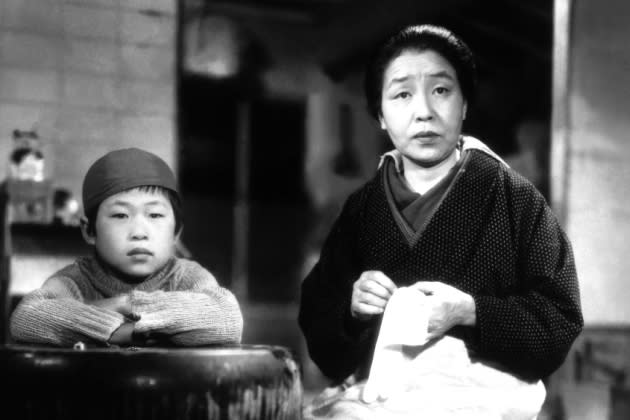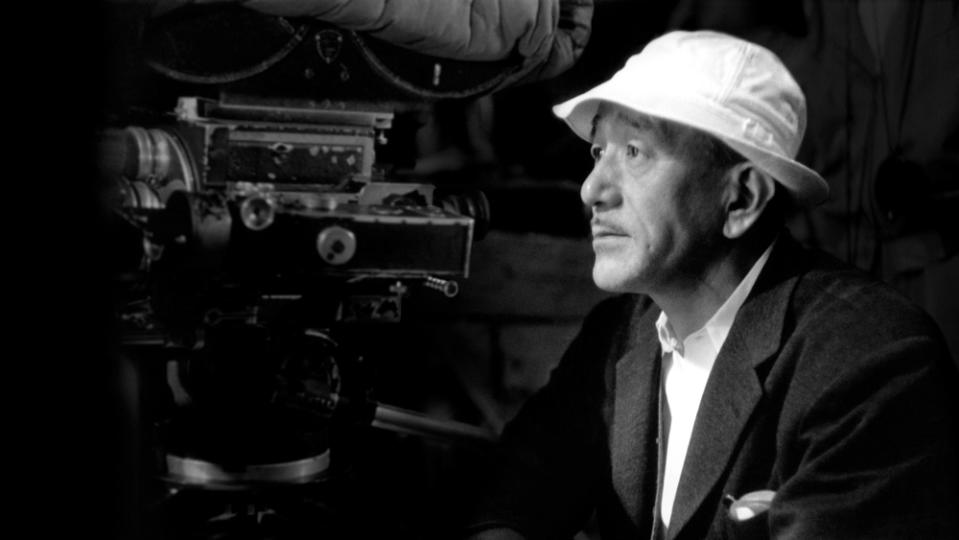Ozu Yasujiro Selections in Cannes Classics Launch Major Celebration of Japan Film Icon (EXCLUSIVE)
- Oops!Something went wrong.Please try again later.

The selection of two restored films by Ozu Yasujiro for the Cannes Classics section will kick-off a six-month long celebration of the iconic Japanese auteur around the world.
Cannes revealed last week that it will showcase Ozu’s 1947 “Record of a Tenement Gentleman” and his 1950 picture “The Muneteka Sisters.”
More from Variety
Variety to Host Global Locations Conversations at Cannes Film Festival
Spain Sees Digital Transformation as Government Funds Future
The screenings mark the 120th anniversary of Ozu’s birth and the 60th anniversary of his death. Ozu died in 1963 on the day of his 60th birthday, a little more than a year after the release of his last film “An Autumn Afternoon.”
Major studio, Shochiku, where Ozu spent the majority of career and made his iconic movies, is planning a series of curated retrospectives, festival screenings, and special events around the world that pay homage to his enduring legacy as one of the most influential directors in cinema. These will last until the end of 2023.
Shochiku was responsible for the 4K digital restoration of “Tenement Gentleman.” Toho was responsible for the restoration of “Muneteka Sisters.” Both pictures will have theatrical releases in France through Carlotta Films.
Additional events and screenings include ‘The Complete Yasujiro Ozu,’ featuring all extant titles, from June 9 through August 13, at The Harvard Film Archive. New York’s Film Forum is hosting ‘OZU 120,’ a three-week Ozu retrospective, including all of the director’s extant titles, June 9-29. Both screening series are supported by the Japan Foundation in partnership with Janus Films and the Criterion Collection. A photo exhibition is to be held at the Margaret Herrick Library in Los Angeles, ‘Academy Foundation / Margaret Herrick Library 60 Years + 60 Photos = 120 Years of Yasujiro Ozu.”
In the U.K., the BFI will celebrate Ozu with: a 16-film retrospective at BFI Southbank from Sept 1 through Oct 3; a U.K.-wide theatrical re-release of “Tokyo Story”’; a box set of newly-remastered titles on BFI Blu-ray; and a collection of films on its BFI Player streaming platform. “Tokyo Story” is also being adapted as a stage play with Simon Friend (“The Father”) developing for London’s West End.
The Taiwan Film & Audiovisual Institute will present a special Ozu retrospective — ‘The Aftertaste of Time: Ozu Yasujiro 120’ — with eight films from June 9 through July 16.
“It’s important to celebrate the achievements of legends in a manner that does justice to their profound and lasting impact, and we feel the program created to celebrate Ozu Yasujiro’s 120-year anniversary is befitting of his legacy,” said Koyama Meri, Shochiku’s head of sales.
“Several generations of filmmakers from all around the world were influenced by Ozu and through this celebration, there will be opportunities to rediscover the artistry and magic that inspired them. And for those unfamiliar with Ozu and his work, these will be moments of delightful discovery. We’re excited to make this celebration a reality and to kick it off in grand fashion at the Cannes Film Festival.”

Ozu’s films examine the basic struggles of life: the cycles of birth and death, the transition from childhood to adulthood, and the tension between tradition and modernity. His titles often emphasize the changing of seasons, a symbolic backdrop for the evolving transitions of human experience. “Seen together, Ozu’s oeuvre amounts to one of the most profound visions of family life in the history of cinema,” said Shochiku.
His career falls loosely into two halves, with WWII the dividing line. His breezier early works are unafraid to acknowledge the influence of Hollywood melodramas or to flirt with farce and cover a range from noir through gangster films to comedies. His later masterpieces are more Japanese, more nostalgic, simplistic and are stripped of much film grammar.
Ozu was born in Tokyo in 1903, is said to have become passionate about cinema at the age of ten and entered Shochiku as an assistant cameraman in 1923. There, he later became an assistant director before ascending to director.
Shochiku, which straddles Kabuki (traditional Japanese live theatre) and cinema is considered one of Japan’s three ‘major’ studios.
Historically, Shochiku has produced films by Ozu, Shimizu Hiroshi, Kinoshita Keisuke, Mizoguchi Kenji, Kurosawa Akira, Oshima Nagisa, Yamada Yoji and Kitano Takeshi. Today, the group operates as film producer, distributor and exhibitor with additional interests in home entertainment and TV production.
Best of Variety
Tony Predictions: Best Musical -- Four Stand Poised to Give ‘Kimberly Akimbo’ Some Competition
This 'Fast and Furious' Arcade Cabinet Allows You to Step Behind the Wheel as Dom Toretto
Sign up for Variety’s Newsletter. For the latest news, follow us on Facebook, Twitter, and Instagram.

